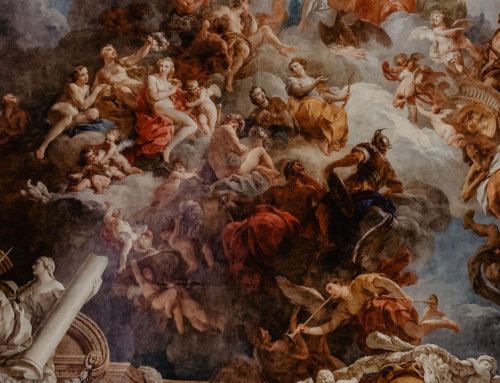Laikos: The Layman
by Pastor Dag Heward-MIlls
The word layman comes from the Greek word laikos which means “having no skills”.
History teaches us that great things can be accomplished through people who “lack skills”. A quick glance at the achievements of lay people or common people will inspire you to use them in the ministry. Through laymen, souls will be saved, cells will be established, churches will grow and God’s work will flourish.
The following are a few definitions of the word layman:
1. A layman is an ordinary person.
2. A layman is a normal person.
3. A layman is a commonplace person.
4. A layman is a usual person.
5. A layman is a regular person.
6. A layman is a common person.
7. A layman is an everyday person.
8. A layman is an average person.
9. A layman is someone who is not a professional.
10. A layman is someone who is not an expert.
11. A layman is someone who is not specialized.
12. A layman is someone who is not skilled.
13. A layman is someone who is not trained.
14. A layman is someone who is not certified.
15. A layman is someone who is not licensed.
Great Achievements in the Church World
1. Lay people were the pillars of the great reformation of the church.
Martin Luther’s translation of the Bible into the language of the common people changed the world. Instead of just being in Latin, the Bible was made more accessible to the common people.
Once the common/lay people had revelation knowledge in their hands they changed the world. Realising that salvation was available to all men through the grace of God they rose up and championed what we now know as the Reformation.
2. Lay people are the pillars of the great Methodist Church.
By the middle of the 20th century, Methodism was the largest Protestant denomination in the United States.The great Methodist church has ridden on the backs of lay people.A very early tradition of preaching in the Methodist churches was for a Lay Preacher to be appointed to lead services of worship and preach in a group of churches called a “circuit”.
The lay preacher walked or rode on horseback in a prescribed circuit of the preaching places according to an agreed pattern and timing.After the appointment of ministers and pastors, this lay preaching tradition continued with “Methodist Local Preachers” being appointed by individual churches, and in turn approved and invited by nearby churches, as an adjunct to the minister or during their planned absences.
3. Lay people were the pillars of the largest single church in the world.
One of the foundational principles on which the Yoido Full Gospel Church is built is the principle of working through lay people.The Yoido Full Gospel Church, founded by David Yonggi Cho and his mother-in-law, Choi Ja-shil, both Assemblies of God pastors, held its maiden worship service on May 15, 1958 with four other ladies in the home of Choi Ja-shil.Membership of the church had reached fifty thousand by 1977, a figure that doubled in only two years. On 30 November 1981, membership topped two hundred thousand. By this time, it was the largest single congregation in the world and was recognized as such by the Los Angeles Times.In 2007 its membership stood at 830,000, with seven Sunday services translated into sixteen languages.
4. Lay people are the pillars of huge networks of churches originating from Nigeria and Ghana.
Both the Redeemed Christian Church of God with its home in Nigeria and The Church of Pentecost with its headquarters in Ghana are known to make good use of lay people. Both of these ministries have huge networks of churches and regularly employ the services of lay people for preaching and pastoring.
The Church of Pentecost was founded by James McKeon, an Irish missionary sent by the Apostolic Church, Bradford, UK to the then Gold Coast.It has grown to have a membership of over 1.7 million members. The Church of Pentecost has over 13,000 churches in 70 countries across all the continents of the world.
In 1952, Pa Josiah Akindayomi founded the Redeemed Christian Church of God in Nigeria.Under the leadership of its General Overseer, Reverend E.A. Adeboye, it has grown to have churches in more than 140 countries, with millions in attendance.Truly, these are great achievements and they have been made possible through the inputs of lay people.
Great Achievements in the Secular World
1. The great government system of democracy was birthed through lay people.
Democracy is giving common people the opportunity to act and change the government if they wish.Democracy is the common man’s power to refuse to live under unacceptable conditions.Democracy is the common man’s participation and influence in a country.Democracy is built upon the principle of equal opportunity given to all common people.
2. The great super-power was given birth to through lay people.
The American Revolution is a classic example of the power of the common or lay people in shaping history.The common man gave birth to a superpower. At the turn of the last century, the American Revolution was a successful experiment that marked the transition of a world controlled by a few to a world controlled by the many.The Revolution was largely shaped by small revolutionary organizations such as the Sons of Liberty. These organizations were not controlled by the rich and powerful landowners butcommon peopleof average social status came together to plant the seeds of the Revolution.
3. The historic election victory of Barack Obama came through lay people.
In May 2008, Barack Obama, first black president of the United States of America, clinched the Democratic nomination for the presidency of the United States.Even though the country’s rich and influential Democrats were Clinton supporters and provided the millions of dollars, Obama raised more than any other presidential candidate in history by using the power of the common person.Obama raised over $80 million in his campaign, most of which came from common people making small individual contributions.
by Dag Heward-Mills
A best selling African Author
The word layman comes from the Greek word laikos which means “having no skills”.
History teaches us that great things can be accomplished through people who “lack skills”. A quick glance at the achievements of lay people or common people will inspire you to use them in the ministry. Through laymen, souls will be saved, cells will be established, churches will grow and God’s work will flourish.
The following are a few definitions of the word layman:
1. A layman is an ordinary person.
2. A layman is a normal person.
3. A layman is a commonplace person.
4. A layman is a usual person.
5. A layman is a regular person.
6. A layman is a common person.
7. A layman is an everyday person.
8. A layman is an average person.
9. A layman is someone who is not a professional.
10. A layman is someone who is not an expert.
11. A layman is someone who is not specialized.
12. A layman is someone who is not skilled.
13. A layman is someone who is not trained.
14. A layman is someone who is not certified.
15. A layman is someone who is not licensed.
Great Achievements in the Church World
1. Lay people were the pillars of the great reformation of the church.
Martin Luther’s translation of the Bible into the language of the common people changed the world. Instead of just being in Latin, the Bible was made more accessible to the common people.
Once the common/lay people had revelation knowledge in their hands they changed the world. Realising that salvation was available to all men through the grace of God they rose up and championed what we now know as the Reformation.
2. Lay people are the pillars of the great Methodist Church.
By the middle of the 20th century, Methodism was the largest Protestant denomination in the United States.The great Methodist church has ridden on the backs of lay people.A very early tradition of preaching in the Methodist churches was for a Lay Preacher to be appointed to lead services of worship and preach in a group of churches called a “circuit”.
The lay preacher walked or rode on horseback in a prescribed circuit of the preaching places according to an agreed pattern and timing.After the appointment of ministers and pastors, this lay preaching tradition continued with “Methodist Local Preachers” being appointed by individual churches, and in turn approved and invited by nearby churches, as an adjunct to the minister or during their planned absences.
3. Lay people were the pillars of the largest single church in the world.
One of the foundational principles on which the Yoido Full Gospel Church is built is the principle of working through lay people.The Yoido Full Gospel Church, founded by David Yonggi Cho and his mother-in-law, Choi Ja-shil, both Assemblies of God pastors, held its maiden worship service on May 15, 1958 with four other ladies in the home of Choi Ja-shil.Membership of the church had reached fifty thousand by 1977, a figure that doubled in only two years. On 30 November 1981, membership topped two hundred thousand. By this time, it was the largest single congregation in the world and was recognized as such by the Los Angeles Times.In 2007 its membership stood at 830,000, with seven Sunday services translated into sixteen languages.
4. Lay people are the pillars of huge networks of churches originating from Nigeria and Ghana.
Both the Redeemed Christian Church of God with its home in Nigeria and The Church of Pentecost with its headquarters in Ghana are known to make good use of lay people. Both of these ministries have huge networks of churches and regularly employ the services of lay people for preaching and pastoring.
The Church of Pentecost was founded by James McKeon, an Irish missionary sent by the Apostolic Church, Bradford, UK to the then Gold Coast.It has grown to have a membership of over 1.7 million members. The Church of Pentecost has over 13,000 churches in 70 countries across all the continents of the world.
In 1952, Pa Josiah Akindayomi founded the Redeemed Christian Church of God in Nigeria.Under the leadership of its General Overseer, Reverend E.A. Adeboye, it has grown to have churches in more than 140 countries, with millions in attendance.Truly, these are great achievements and they have been made possible through the inputs of lay people.
Great Achievements in the Secular World
1. The great government system of democracy was birthed through lay people.
Democracy is giving common people the opportunity to act and change the government if they wish.Democracy is the common man’s power to refuse to live under unacceptable conditions.Democracy is the common man’s participation and influence in a country.Democracy is built upon the principle of equal opportunity given to all common people.
2. The great super-power was given birth to through lay people.
The American Revolution is a classic example of the power of the common or lay people in shaping history.The common man gave birth to a superpower. At the turn of the last century, the American Revolution was a successful experiment that marked the transition of a world controlled by a few to a world controlled by the many.The Revolution was largely shaped by small revolutionary organizations such as the Sons of Liberty. These organizations were not controlled by the rich and powerful landowners butcommon peopleof average social status came together to plant the seeds of the Revolution.
3. The historic election victory of Barack Obama came through lay people.
In May 2008, Barack Obama, first black president of the United States of America, clinched the Democratic nomination for the presidency of the United States.Even though the country’s rich and influential Democrats were Clinton supporters and provided the millions of dollars, Obama raised more than any other presidential candidate in history by using the power of the common person.Obama raised over $80 million in his campaign, most of which came from common people making small individual contributions.
by Dag Heward-Mills
A best selling African Author





